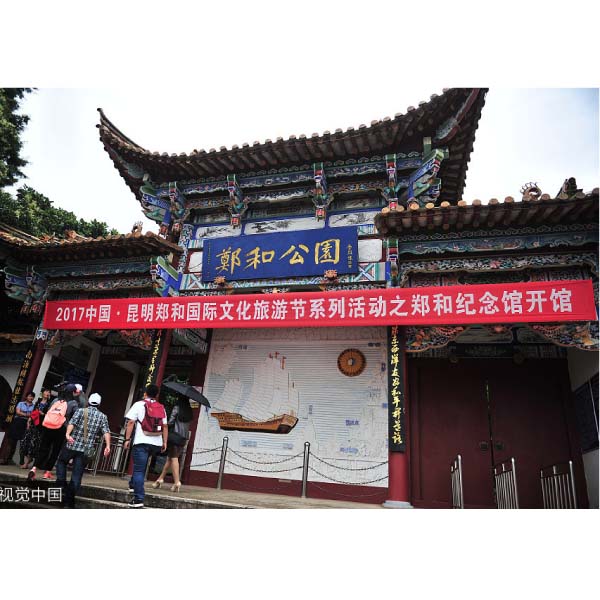There is much in Nanjing City – China’s capital in ancient times – to celebrate the life and achievements of Zheng He, the great explorer, mariner, admiral of the royal fleet and diplomat. Parks and halls abound to remind the present generation of his legacy.
Yet it is only fitting that the new 1,600 square meter Zheng He Memorial Hall should be in his hometown in Jining county, Kunming, the capital city of Yunnan province in southwest China.
Also known as Cheng Ho, he led seven voyages to the Indian Ocean between 1405 and 1433 during the Ming Dynasty (1368-1644). The building houses historical material and documents on his visits to over 30 Asian and African countries and regions. Some believe he may have reached South America as well, long before Columbus did in 1492.
The memorial hall is in the 250-hectare Zheng He Park, built in 1980. Relief sculptures on both sides of the park entrance gate are named “the Seven Navigations to the West by Zheng He,” depicting his life and achievements.
There is also the Zheng He Memorial Pavilion, the tomb of Ma Hazhi (馬哈只, Zheng He’s father), as well as the tombs of revolutionary martyrs.
In Nanjing, where he lived and used as the base for planning his navigational exploits, there is a Zheng He Memorial Park in the Bai Xia District. It was his residence and garden, christened and renamed in 1985 to commemorate the 580th anniversary of Zheng’s first western expedition. The park has since been renamed China Foreign Cultural Exchange Theme Park.
In Melaka, Malaysia, the Cheng Ho Cultural Museum likewise remembers the explorer’s life and voyages.
It is believed that the 5,110-square-meter building is on the original site of the warehouse complex Guan Chang, built by Zheng He around 600 years ago to store – temporarily – goods acquired during his travels.
The Singapore-based International Zheng He Society is devoted to exploring and understanding the mariner’s impact and legacy on the places he visited during his voyages. Zheng He explored the seas with a royal fleet of 100 ships and 28,000 people under orders from the Emperor Yong Le.
Born in Kunming in 1371, Zheng He was a member of the Hui ethnic minority. He was born Ma He (馬和).
Categories
Zheng He (鄭和) remembered in China, overseas
